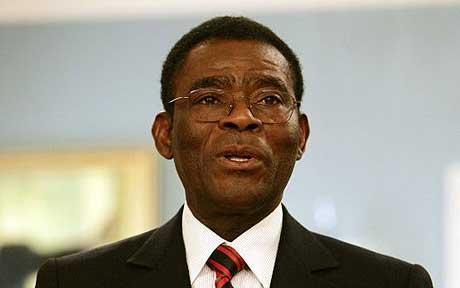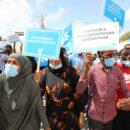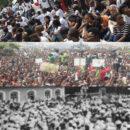Equatorial Guinea emerges as macroeconomic success story, but data deceptive – From Cross Border Information

This is a View article from the African Energy newsletter, a source of independent analysis on the continent’s energy industries produced by Cross-border Information, a business intelligence company with a long established research focus on the politics, energy and financial sector trends of Africa and the Middle East.
As memories of its violent past and episodes such as the “˜Wonga coup’ recede, and with the joint hosting of the 2010 Africa Cup of Nations deemed generally to be positive, Equatorial Guinea is showing up on lists of sub-Saharan African success stories, its oil and gas-fuelled GDP producing graphs showing sustained growth, and propelling it to the rank of middle-income country. An African Development Bank (AfDB) Country Strategy Paper (CSP) released on 18 July reminds us that Equatorial Guinea has sub-Saharan Africa’s highest per capita income and has the potential to emerge as a regional energy hub, generating electricity from hydropower, as well as producing gas for local processing – pioneered by the Atlantic Methanol Company plant – and export, and supplying crude to US and other buyers.
However, against this promising background, the AfDB says that in development terms, “Equatorial Guinea’s major challenge is to use its oil wealth to achieve sustainable and more inclusive growth so as to improve the country’s social status.” As the CSP politely puts it: “Despite sustained growth and its huge natural resources, the country is lagging behind on the improvement of social indicators. Three-quarters of its population are considered poor, job creation in the private non-oil sector is low and the country’s institutional capacity is limited.” A reading of the data on social and governance indicators strongly supports this view.
Formally, the government is full of good intentions. Its Vision 2020 programme and National Economic and Social Development Plan 2008-20 seek to transform EG into an emerging economy by 2020. The plan is based on four pillars: building world-class infrastructure; building human capital and improving quality of life; diversifying the economy through the private sector; and instituting good governance.
EG has moved fastest on the infrastructure pillar, in part spurred on by the need to prepare for the Nations Cup and the presidency’s preference for investing in big schemes. The International Monetary Fund has criticised the government for its focus on “prestige projects”.
Some three-quarters of EG’s population are still estimated to live on less than $2/d. The AfDB points out that those most prone to poverty are women and large single parent families with at least six children – representing an astonishing 79% of households and 89% of the population. While the macroeconomy has soared, EG’s position on the UN Development Programme’s Human Development Index has dropped, to 136th out of 187 countries in 2012 from 115th out of 176 in 2008.
As ever, personalised politics and the domination of a small group gathered around President Teodoro Obiang Nguema Mbasogo are factors that weigh heavy on a population anxious to drag itself out of poverty. Obiang was re-elected in a November 2009 presidential election for another seven-year term, while his Partido Democrático de Guinea Ecuatorial predictably won legislative elections held on 26 May this year, in which the opposition Convergencia para la Democracia Social won just one seat in the two-chamber parliament.
While African governments looked anxiously on as the Arab Spring unfolded in early 2011, Obiang offered the prospect of constitutional reform with the establishment of new institutions; this was approved by a large majority in a November 2011 referendum. However, there is little sign of implementation. According to the World Bank’s 2011 World Governance Indicators, EG scored 44 out of 100 for political stability and non-violence but only scored three for accountability and participation. In the sort of careful language that multilaterals are constrained to use, the AfDB observes: “Stable institutions and political progress notwithstanding, there is still need for improvement, notably with respect to the enhancement of civil rights and liberties.”
EG lost its candidate status with the Extractive Industries Transparency Initiative in April 2010 after failing to do enough to implement the initiative (AE 185/24, Governance in the frame with EITI, new British bribery law). The AfDB notes: “limited institutional capacity, and notably a disorganised civil society that lacks the technical capacity to fully participate in the initiative”.
Oil regresses, gas fuels growth
Economic growth is slowing – to 4.9% in 2013 against 5.5% in 2012, and probably negative growth in 2014, according to the CSP, due largely to a gradual drop in crude oil production. Production reached 340,450 b/d in 2011 but there has been a long-term fall in output as six oil fields – Zafiro, Okoumé, Alba, Ceiba, Jade and Serpentina – have matured. This could be offset by natural gas exploitation and the promotion of non-hydrocarbons sectors. Government plans include a new petrochemicals complex at Riaba, and a second LNG train is now planned for 2019.
Using infrastructure projects as a driver of development is feasible in such a wealthy country. The AfDB observes that EG “is striving to position itself as a regional electricity transportation and supply centre”, and it already has greatly improved its port and airport facilities. And away from hydrocarbons, there is other energy potential. The 120MW Djibloho hydroelectric plant is operational and the 200MW Sendje hydro plant is expected to be commissioned by 2015; EG will be able to generate surplus energy for export to Cameroon and Gabon.
This is an exciting prospect, but as the AfDB observes: “to take advantage of these opportunities, the country will have to overcome a number of persistent obstacles and, most of all, ensure a healthier business climate, one that gives more assurance to private sector operators”.
Clan politics trump all
Such liberalisation can only come where there is a political will to support it. The sort of business and professional lobbies, trade unions and grassroots groups that often drive this sort of change have long been crushed in EG.
The CSP underlines the underdeveloped state of local business, recording that only some 1,000 private companies are registered at the Chamber of Trade, barely 200 by the Employers’ Association and 350 by the Ministry of Labour. The majority of these are offshore oil companies (led by US, Chinese and South African firms), foreign construction companies involved in major public infrastructure projects (from France, Italy, Serbia, Morocco, Lebanon, Egypt and China) and companies that directly benefit from oil revenue in the telecommunications, banking and retail distribution sectors. Local SMEs and micro-enterprises control only a small share of the market, mainly in traditional crop farming (timber, cocoa), port activities, the hotel industry, services and retail imports.
Much has changed in EG over the last decade, as reflected in the headline macro figures and shiny building projects. But the social indicators highlight just how little has changed for the majority, and the outlook for radical change is unpromising as Obiang prepares for his succession, with his most controversial son, vice president for defence and national security Teodoro Nguema Obiang Mangue, known as Téodorin, holding pole position. Obiang will be 75 in 2016, when the next presidential polls are due and his revised constitution quietly removed age limits. The oil companies would prefer mines, industry and energy minister Gabriel Mbega Obiang Lima to replace his father, but clan politics do not work that way. Téodorin has a more powerful mother, which outweighs the charges standing against him in France and the United States (AE 175/24, Business as usual in the esoteric world of Equatorial Guinea politics).





